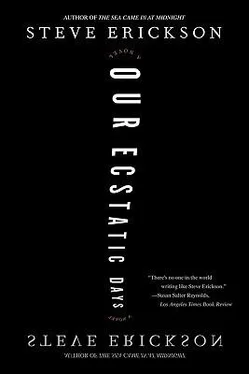He goes out onto the terrace of the Chateau and says, more to himself at first, where are You. He barely knows what it is, his own crying. He tells himself he hates her now but knows he doesn’t. Standing there on the terrace, over the sound of the lake he listens for her heart, but wherever it is now, it’s too far away. Standing there on the terrace, looking out over the lake listening, it occurs to him for the first time they’re all gone too, the disciples. The faithful who for years worshipped at the waterline of the Chateau X are gone and it occurs to him that in fact now that he thinks about it, he hasn’t seen them for a while; and that’s when he
trees set loose in a special panic, and the question What’s missing from the
knows for certain she isn’t coming back.
Turning his back on the lake he walks back into the Chateau from the terrace and through the main lair, back out through the transitional chambers into the grotto where he edges along the small stone walkway that circles the water leading to an old door with a brass ring for a knob that he used to know very well. He finds the door slightly ajar and opens it and steps in, gazing over the shelves that once held in captivity thousands of melodies from a thousand snakes expired in menstrual blood, but now the shelves are empty as if ransacked although the webs in the corners indicate the Vault was already vacated long ago, the songs having escaped of their own accord or having been set free by someone who couldn’t stand to keep them anymore.
He thinks maybe he might find one in particular but when he doesn’t he leaves the Vault and, one more time, goes back up into the Lair to stand gazing around him in a daze, seeing nothing for a moment until, blinked clear of tears, his eyes lock on the mantle above the hearth. He walks over to the hearth: i don’t remember this he thinks — but it had always been night-time before, his eyes cast down in subjugation. Be a man who never looks up and you’re likely to miss something.
i don’t remember this here. He holds the toy monkey in his hand then goes back out through the transitional chamber into the entryway, back out onto the stone steps of the grotto to his boat. Still naked he begins to row back out onto the lake, and rows for a while east by southeast then veering slightly northward from the single coordinate drawn above him by the line of a collapsed skytram from many years before. After a while he comes to the place. This is the place he’s rowed by and past and over many times as though it meant nothing to him, as though it held no recollection of anything at all for him; but that was night-time and this is day, and maybe he’s known all along anyway. All along
world? calling up to me from that womb of mine that already predated me, that
he’s known, ignoring this place as if it couldn’t hurt his heart, but now everything hurts his heart, and he rows here and stops and stares down into the water, leaning over the boat and putting his face as close to the water as he can without capsizing, wondering if god lives down there and might explain something to him at long last. Out on the wide open lake at the place, above the spot, without her, abandoned again and his heart feeling not only what it’s never felt but all the things it’s felt but denied, breaking beyond what he can stand, he believes he’s drifted into the fourteenth room of the Hotel of Thirteen Losses. When god doesn’t talk to him from beneath the water Kale finally begins to row back along the shoreline he followed the last time he saw her disappearing into the Chateau doorway. He’s stopped crying, rowing relentlessly until he reaches the black cove of burned trees and black water where he climbs out of the boat and lies where he lay before, with the red monkey in his hand on the black Zed shore.
This crucible of loss now only makes him realize how lonely he’s always been. It only makes him realize that although he might not have had a name for desolation it was there anyway. He’s now aware in a way he’s never been how he believes no one cares for him, and what it means to be this untouched by another human heart. He’s now aware in a way he’s never been how the deflowered heart has an altogether other kind of music, a music altogether different from the percussion of blood. He’s now aware in a way he’s never been of how seared into the retina of memory are the echoes of all the questions he never got to ask someone, all the great questions of life and love and death that begin to occur to you when you’re a small boy, maybe in the night just as you’re about to fall asleep; he’s now aware in a way he’s never been of how there was never anyone there to answer these questions for him. Feeling forsaken as he hasn’t felt since he was a small boy in
womb of mine already older than I was, the question calling up to me amid the
a silver boat, he’s about to slip off into the sleep of the void when, like a voice speaking out loud to him, like someone right there at his side, there floats up from somewhere deep in his mind something that was left there years ago, planted in his ear one night while he slept and having sunk deep into him, and now opened like a time capsule that was waiting for precisely this moment of loneliness to unlock it, there in the darkening hush of the trees
your mama loves you
and he sits straight up to it. Like someone right there at his side has whispered it. He sits straight up to it and it’s still there, the thing he just heard, it hasn’t disappeared like a dream. It hasn’t vanished into memory like one of the Lapses of the Lake. It’s still there in the air and, seeing it, his eyes light, like fireflies darting above the grass.
historical rumors and little spasms of collective memory ripping outward, and
at twilight I would look out toward Tokyo Bay from the window of the ryokan
where I stayed when I first got to Japan and I would watch the pixilated black
waves rolling in and with them they brought that memory I had forgotten, of
He gets out late winter. He’s off on the exact day by thirty-some hours, which isn’t bad calculations. He made a decision when he went in to keep track of the days, because he knew it was the intention of his jailers to jettison his sense of time; they brought him in 2037in a metal truck with no windows. The rumor is that the penitentiary is somewhere in the plains of the Montana-Saskatchewan annex. When he’s released, a metal truck takes him back to Seattle; they open the doors of the truck and the glitter of the afternoon sea is like glass in his eyes. He sits back in the truck until someone says, Move.
standing with my uncle as a little girl on the banks of the river and seeing the
They put him on a boat going down the coast to Los Angeles. For five days and fifteen hundred miles he doesn’t see anyone except a soldier here and there, like the guards at the Northwest-Mendocino border. The boat sails into L.A. mid-dusk, past the smoky moors of the Hollywood Peninsula, navigating the outlying swamps where the Hancock Park mansions loom in ruin, water rolling in and out of the porticoes. It crosses the rest of the lagoon into downtown, then up the main canal. Cale can see the smaller canals trickling off between the buildings that are black like the mansions behind him, and there’s a sound of bubbling music from the Chinese storefronts along the water. It comes out of the buildings, a distinct and different melody from each one; addresses on the doors are scratched and defaced, and there are no signs on the street corners anymore. Ask someone how to get to this place or that, and she’ll sing you the directions.
Читать дальше











